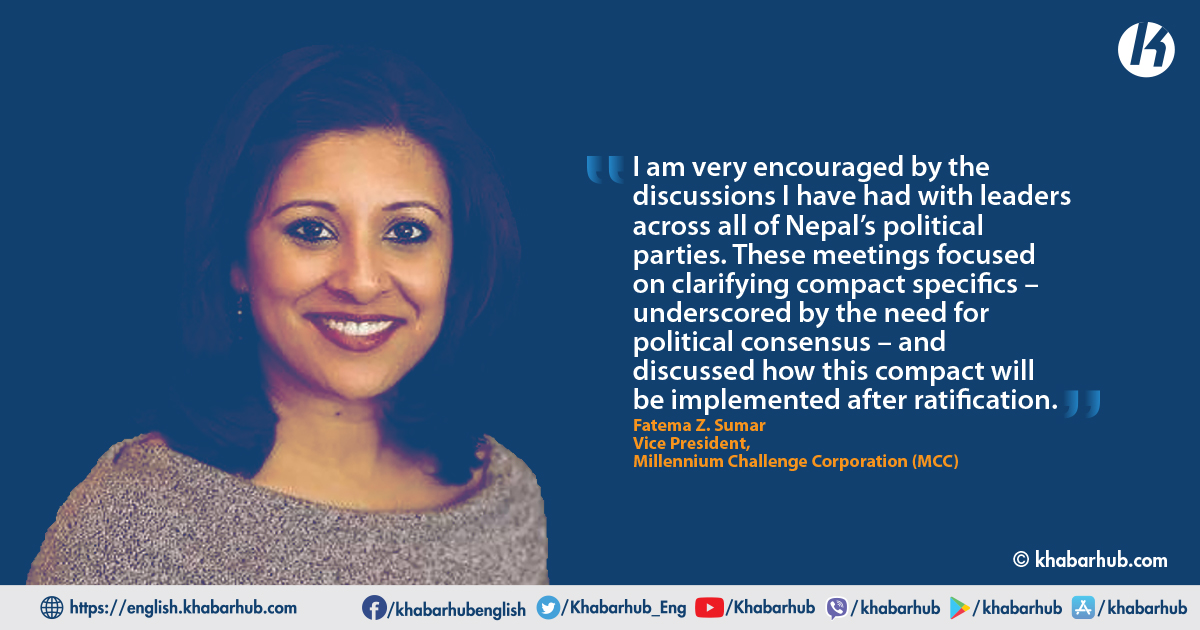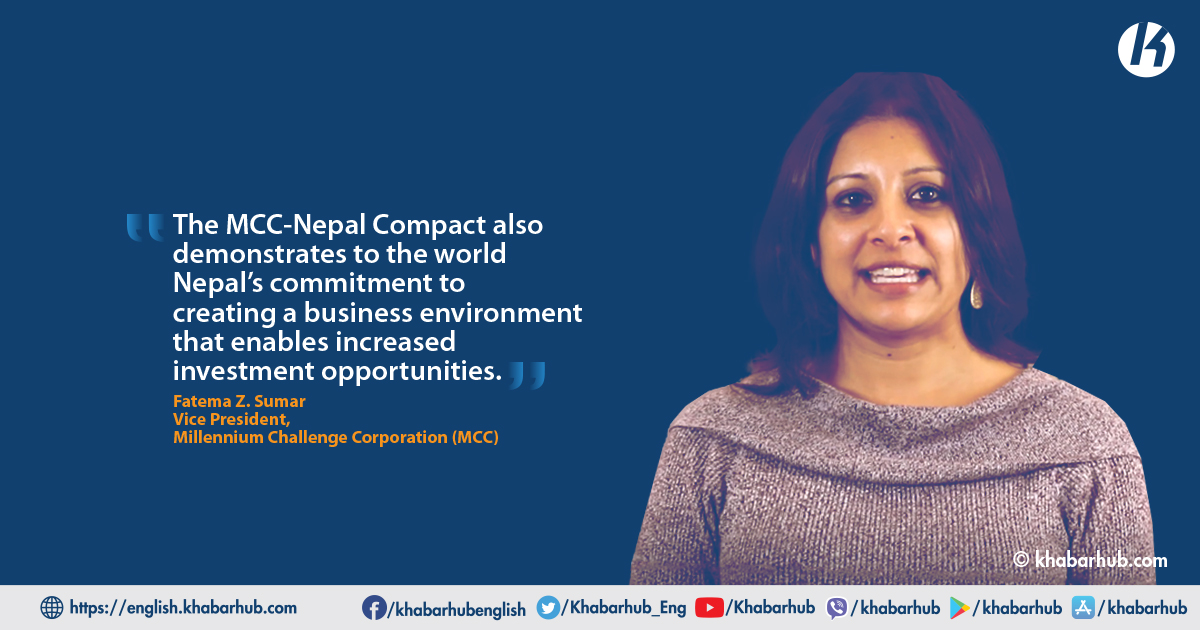0%

KATHMANDU: Vice President of Millennium Challenge Corporation (MCC) Compact Operations, Fatema Z. Sumar, arrived in Kathmandu on September 9.
She held talks with political leaders, including Prime Minister Sher Bahadur Deuba, CPN-UML Chairman KP Oli, Maoist Center Chairman Pushpa Kamal Dahal “Prachanda”, political leaders, government officials, and business and community leaders.
During the meetings, she discussed the required next steps to implement the $500 million MCC-Nepal infrastructure program, and addressed the clarification questions provided by Nepal’s Ministry of Finance.
Fatema specifically affirmed that the MCC grant program has no military component, will not impede Nepal’s sovereignty, and Nepal’s constitution will prevail over the agreement.
Prior to negotiating and signing the compact in 2017, the Government of Nepal had designed the 5-year grant program to provide more reliable electricity and lower power and transportation costs for all Nepalis.
In a conversation with Khabarhub’s Editor Ishwar Dev Khanal, MCC Vice President Fatema Z. Sumar elucidated on various aspects of MCC, among others. Excerpts:
How should Nepalis understand your visit?
Having visited Nepal many times before, I’m excited to be back and, more importantly, to be able to speak to the Nepali people about the MCC-Nepal Compact.
Through our conversations, I hope to provide clarity on any misconceptions about the MCC Nepal Compact and address the false rhetoric against MCC. Any partnership, which is what MCC is, should be built on honest and fact-based open dialogue.
How did your meetings with Nepal’s leaders go?
I am very encouraged by the discussions I have had with leaders across all of Nepal’s political parties. These meetings focused on clarifying compact specifics – underscored by the need for political consensus – and discussed how this compact will be implemented after ratification.
Most importantly, the leaders I have met reassured me of their support for the Electrical Transmission and Road Maintenance projects, recognizing the critical value of this grant to improve the lives of Nepalis; advance Nepal’s business environment; and make Nepal a leader in the South Asia energy sector.
MCC welcomes the commitment of Nepal’s leaders, and we look forward to moving beyond ratification.
How do you feel about the ongoing protests against MCC?
Freedom of speech and the ability to express one’s beliefs are very important to me. These values are fundamental to democracy and a healthy society.
But the intentional spread of false information is harmful in a democracy. False information about MCC has spread on social media and might be fomenting detractors.
Regardless of these negative forces, I support the people of Nepal and their right to peacefully express their views.
I do want them to know that this compact is in their hands. Their elected officials are the ones who will choose whether to support and implement the MCC-Nepal Compact, not us.

Are you hopeful that MCC would be ratified?
Yes, because of what it will mean for all Nepalis. Modernizing Nepal’s electrical grid will have a profound impact across the entire country, both providing more reliable electricity and allowing Nepal’s economy to grow through increased business opportunities and income through exports of excess energy.
There is no better time than now to begin building a more prosperous future for all Nepalis.
There have been widespread rumors, confusion, and misinformation on MCC. Some say it undermines Nepal’s sovereignty, independence and constitution. What do you have to say to all that?
I want to be very clear: That is false. The MCC-Nepal Compact does not, and will not, infringe on the sovereignty of Nepal. The Constitution of Nepal prevails over the MCC-Nepal Compact.
The United States and Nepal have many shared values, and among them is the respect for a nation’s sovereignty.
When I worked with the Government of Nepal from 2014-2017 to design and negotiate this compact, the MCC grant program received an incredible amount of support – from the Prime Minister to members from every political party.
Unfortunately, since that time and especially over the last 18 months, there seems to have been a coordinated and sophisticated campaign to spread misinformation about MCC and stop the program.
That is why it was so important for MCC to publicize our recent letter to the Government of Nepal. We pride ourselves on being an honest and transparent agency, and this is another example of our commitment to these values.
It is my hope that every Nepali reads our letter so they may know the truth about MCC’s partnership with Nepal and how this grant program will help nearly 23 million Nepalis.
What are the key economic opportunities or benefits of MCC and how will it help Nepal?
The Nepali Government helped design the compact to increase the availability and reliability of electricity and make travel and transportation in Nepal cheaper, safer, and more sustainable.
The Electrical Transmission Project will result in approximately 300 km of powerlines – that equals one-third of the length of the entire country.
This will help expand access to Nepal’s clean hydropower electricity to homes and businesses all the way to the Indian border to facilitate expanded energy trade.
The Road Maintenance Project will also introduce a new road maintenance program that allows the government to focus on maintaining existing roads along with building new ones.
An underlying cause of high transportation costs is poor road quality due to insufficient maintenance. Improved roads will mean more cost-effective and efficient transport of goods, services, and people across Nepal.
The MCC-Nepal Compact also demonstrates to the world Nepal’s commitment to creating a business environment that enables increased investment opportunities.
The first step in the process is investments to improve the country’s infrastructure. Our partnership will help Nepal’s economy grow by creating stability and jobs, as well as attracting private sector investments to the energy and transportation sectors.
How will the MCC-Nepal Compact improve Nepal’s electricity sector – including the India cross-border interconnection – and why is this important?
The Government of Nepal worked in close collaboration with MCC energy experts to design a project for Nepal’s power sector that will focus on completing the “missing” segment of Nepal’s 400kV East-West transmission backbone, and in completing the Nepal portion of the second cross-border line with India.
The electricity transmission projects will increase the capacity of the current system, while reducing system losses.
This additional capacity will increase grid stability and reliability so that Nepal’s transmission network is less vulnerable to disruption.
It will allow for increased electricity consumption by improving the supply of electricity to Nepal’s power grid. For example, industries will no longer need to rely on diesel-fired generators as backups.
The New Butwal-Gorakhpur cross-border transmission line with India will facilitate imports of electricity in the dry season when Nepal’s power generation is typically one-third of its wet season output, and export surplus energy during the wet season when there is insufficient domestic demand.
South Asia is still amongst the least connected regions in the world in terms of electricity and energy trade. The cross-border transmission interconnection enables Nepal to take lead in the energy sector through trade with India and other countries such as Bangladesh.
Would you highlight some of the MCC’s successes in other countries?
To date, MCC has signed 37 compacts with 29 countries worth more than $14 billion dollars.
A great example is Mongolia, which first partnered with MCC from 2008 to 2013 for a compact that invested $285 million dollars in education, health, transportation, and energy.
Together, MCC and the Mongolian government reduced the impacts of non-communicable diseases and injuries, provided enhanced vocational training, expanded distribution of energy-efficient household products, constructed roads that expanded commercial traffic, and spurred economic growth for an estimated 2 million Mongolians.
Based on this success, the Mongolian government requested and signed a second $350 million-dollar compact agreement with MCC in 2018 to develop the country’s water infrastructure.
Within the last month, the Mongolian government broke ground on a $93 million-dollar advanced water purification plant that will boost the bulk water supply production capacity in Ulaanbaatar by 65 percent over its lifetime.
Additionally, MCC and the Government of Senegal celebrated the official implementation of our $550 million-dollar Senegal Power Compact this week on September 9.
The grant will modernize Senegal’s electricity network and help secure access to more reliable and affordable electricity for more than 12 million people.
This is the second major Senegal infrastructure grant. From 2010-2015, MCC provided more than $300 million dollars to rehabilitate 372 km of roads in critical transportation corridors, creating jobs and economic growth.
Another example is Liberia, which had one of the lowest electricity access rates in the world when its compact was signed in 2016. Only 2 percent of the population had access to the electric grid.
The MCC-Liberia Compact supported the rehabilitation of the Mt. Coffee Hydropower Plant, the country’s largest source of power, and more than doubled the country’s entire power generation capacity.
Now 12 percent of the population has access to the power grid (a 500 percent increase over five years) and business owners now pay over 30 percent less in power expenses allowing them to expand their services and increase their income.

Can you talk about the MCC-Nepal Compact and its effect on Nepal’s investment climate for both domestic and international investors?
While many other development partners provide funding for infrastructure, what sets MCC apart is its focus on a strict five-year compact period.
Large capital projects in Nepal frequently face time and cost overrun challenges. It is not uncommon to hear of projects that cost multiple times the original estimate and take many more years than planned to complete.
MCC’s model minimizes these challenges through several measures, one of which is the completion of all preparatory activities before starting construction.
More specifically, all MCC compacts are required to use fair and open contract bidding processes, leveling the playing field for all companies – especially local and smaller businesses.
Along with the Nepali jobs created by the $500 million MCC grant, the Government of Nepal’s increased institutional capacity and new infrastructure will enable and entice private sector investments through Nepal’s more robust and thriving energy sector.
What is the progress on the Compact following the government’s approval of several proposals including the EIA, among others?
The Millennium Challenge Account Nepal (MCA-Nepal) is a Government of Nepal entity and has been leading the project preparations for the MCC compact, including completing the Environmental Impact Assessment (EIA) in April 2021.
Early on after the signing in 2017, the Government of Nepal created the independent Electricity Regulatory Commission, designating the Electricity Transmission Project as a Project of National Pride, and established MCA-Nepal as a project-implementing entity under the Ministry of Finance.
Now, we stand ready to implement these critical infrastructure projects. But one critical step remains –parliamentary ratification.
How important is the MCC Compact to the U.S. and Nepal relationship?
We respect Nepal’s sovereignty and recognize that it is Nepal’s choice to continue the partnership with MCC. For more than 70 years, the United States and Nepal have enjoyed a friendship built on our shared values.
If Nepal wishes to no longer receive an MCC grant, this will not lead to any souring of relationship between our countries – the United States and Nepal friendship will endure.
How long can MCC wait for Nepal to endorse the agreement?
We recognize that managing the COVID-19 pandemic is the government’s top priority. As the U.S. government continues to support Nepal’s COVID relief efforts, including by providing life-saving medical supplies and over 1.5 million vaccines to date, MCC is ready to help with another major priority – the Nepali economy.
With ratification now more than two years past the agreed-upon timeline, there is no better time to act than now.
Parliamentary ratification at this time would allow the government to begin implementing $500 million dollars in infrastructure projects over the next five years, boosting Nepal’s economy and directly benefiting nearly 23 million Nepalis through transparency and accountability.
MCC remains committed to helping Nepal foster economic growth. However, a ratification stalemate cannot continue indefinitely. The Government of Nepal must choose to go forward; or decide that this grant is no longer needed.